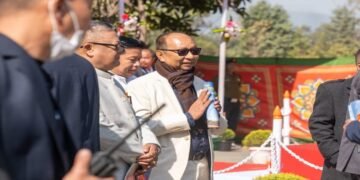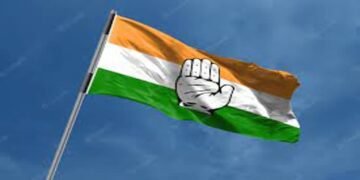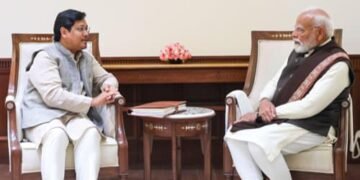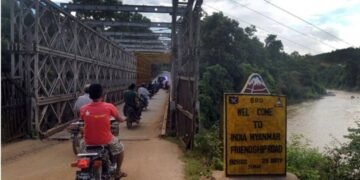By M.Devanand Sharma
Imphal (Manipur) Sept 25: On the eve of the 45th Raising Day of its armed wing the People’s Liberation Army (PLA), which falls on September 25, the proscribed Revolutionary People’s Front (RPF) has offered revolutionary salute to all the ‘heroes’ who sacrificed their lives in the course of the struggle for the national liberation of Manipur and its people.
On the occasion, the outfit also extended greetings to all the revolutionary organizations and the people of Manipur and WESEA region.
In his message to the people on the occasion, RPF acting president MM Ngouba said that, in history, there came certain moments inevitably that remain indelible and etched into the collective memory of generations to come.
According to Ngouba, the current events unfolding in Manipur will undoubtedly be recorded in the annals of history.
The actions of the Kuki armed groups which are carrying out attacks, killings, committing atrocities and heinous crimes against the civilians were not limited to short period, rather, they were premeditated and organised over an extended period of time, a fact they have acknowledged.
These reprehensible activities have been going on for an extended duration making it increasingly difficult for them to conceal their true intentions, supported by a wealth of evidence.
The RPF acting president further said that the campaign being carried out in Manipur by Kuki armed groups operating under Suspension of Operations (SoO) is clearly a campaign of terror.
The persistence of their ongoing activities, which have remained unchecked and unprohibited thus far, can be attributed to the fact that they have received patronage, protection, shelter, financial support and political backing including propaganda assistance from a godfather.
It is incumbent upon all of us to jointly uncover the roles played by this godfather, confront their deplorable actions with determination and ensure that they face the consequences of their crimes, he said.
According to Ngouba, the definition of the term ‘Terrorism’ is complicated and controversial.
Generally, terror refers to an intense and overwhelming feeling of fear and dread characterised by a sense of imminent danger or impending harm.These circumstances can arise from various factors.
Terror in the term terrorism represents the impact of deliberate use of heinous activities to achieve specific goals, causing extreme fear and profound psychological distress.
Terror in the word terrorism is not accidental or unintended consequence but it is deliberate and intentional action.
Terror serves as a crucial strategy in the execution of acts of terrorism.
The primary objective of terrorism is to induce an overwhelming state of fear within a specific group of individuals, unarmed civilians or symbolic targets through deliberate acts of violence or threats of violence.
Terrorism invariably includes political, ideological, social or religious objectives, leaving no room for doubt and employs terror as means to either compel the government or the population to concede or to forcibly impose their goals.
At times, terror is employed as a tactic to incite a retaliatory or responsive action from the targeted group.
There is no doubt or dispute that the campaign undertaken by the Kuki armed groups in Manipur qualifies as terrorism, Ngouba contended in his message.
With the Kuki armed groups receiving patronage, protection and assistance, and being permitted to carry out a campaign of terror within a legal framework, the involvement of the Indian government and its security forces makes it evident that India is conducting a campaign of ‘State-sponsored terrorism’ in Manipur, the RPF acting president said.
Continuing his message by reminding people about the Manipuri proverb which reads in English ‘If the dog is mad find the owner’, he said India cannot evade the repercussions of engaging ‘State-sponsored terrorism’ in Manipur, for, India as a nation has signed numerous international agreements aimed at combating terrorism.
Moreover, India’s involvement in ‘State-sponsored terrorism’ in Manipur does not merely impact Manipur alone but also has far-reaching consequences for regional and global stability.
India, like some other countries, is actively pursuing a permanent seat in the United Nations Security Council as part of the ongoing reforms within the United Nations.
It is a significant and crucial endeavour, which is why the countries aspiring for these seats are closely observing not only each other but also the actions of other nations.
The agreements signed by India under United Nations to combat terrorism stand in stark contrast to the ‘State-sponsored terrorism’ being conducted in Manipur by India.
There is no doubt that the stakeholders invested in UN reform efforts are not going to ignore the issue of ‘State-sponsored terrorism’ conducted by India.
Recent statements made by certain UN experts concerning the Manipur issue, regardless of their accuracy, and India’s response to them serve as an illustration of India being under scrutiny.
Now, a fundamental question arises: Does the government’s silence, despite being aware of the campaign of terror against unarmed civilians by the armed groups operating under legal agreements’, not constitute a crime? Furthermore, if their inaction is indicative of consent, could it not be construed as endorsing the actions of the terrorists and, in essence, as ‘State-sponsored terrorism’? The fear instilled upon the people, along with the escalating impact of terror, signifies the attainment or successful achievement of terrorism’s objective.
For this very reason, laws at international level related to terrorism, including those under the UN, consider not only ‘action’ but also ‘inaction’ and ‘omissions’ as factors that can be subject to accountability.
The crucial aspect is that when a government is aware of a group’s terrorist activities, possesses the capability to prevent or halt those activities, yet consciously refraining from taking action due to political, strategic, or ideological motivations, it unequivocally holds accountability for supporting or sponsoring terrorism, an irrefutable fact.
In another scenario, a government’s failure to uphold its commitments and agreement, combined with its lack of actions against a group engaging in terrorist activities is considered an indirect support or sponsorship of terrorism.
This blurs the line between active involvement and complicity, but it holds significant implications in the realms of international relations and legal accountability.
International law does not have specific article that directly addresses ‘State-sponsored terrorism’ however, several principles and treaties encompass aspects relevant to State-sponsored terrorism, be it action or inaction of the government.
The UN Charter prohibits the use of force in International Relations except for cases of self-defense or when authorized by the UN Security Council.
India’s deployment of thousands of security forces and its allowance of the Kuki armed groups operating under an agreement with the government, to engage in terrorism without any hindrance in Manipur have violated the UN Charter’s ‘Prohibition of use of force’.
The utilization of Indian security forces and the contracted forces in Manipur cannot be deemed irrelevant to international relations.









































